

On Social Learning, Sensemaking Capacity, and Collective Intelligence. Learning power. Learning power refers to the collection of psychological traits and skills that enable a person to engage effectively with a variety of learning challenges.
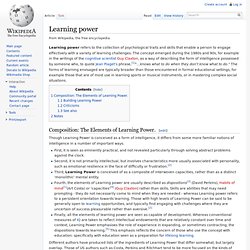
The concept emerged during the 1980s and 90s, for example in the writings of the cognitive scientist Guy Claxton, as a way of describing the form of intelligence possessed by someone who, to quote Jean Piaget's phrase,[1]"…knows what to do when they don't know what to do. " Dr Ruth Deakin Crick - Graduate School of Education publications. Summary Complexity and Systems Thinking: implications for pedagogy Evaluating Wider Outcomes of Schooling Authentic Enquiry 21C competences: learning to learn, citizenship, creativity.
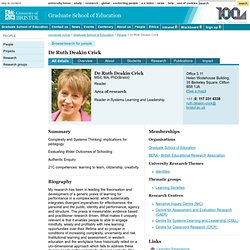
Biography My research has been in leading the theorisation and development of a generic praxis of learning for performance in a complex world, which systemically integrates divergent imperatives for effectiveness: the personal and the public, identity and performance, agency and structure. I have contributed significantly to a body of inter-disciplinary evidence which demonstrates that a person's or a group's learning identity and dispositions profoundly influence their performance in a range of contexts and these relationships are reciprocal.
SAPPA_2008_1. Whatstheissue. Building-learning-power-in-dalton. Professor Guy Claxton. Professor Guy Claxton is an internationally acclaimed, writer, consultant, lecturer and academic, specialising in creativity, education and the mind.
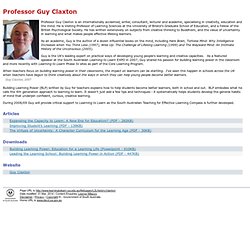
He is Visiting Professor of Learning Sciences at the University of Bristol's Graduate School of Education, and a Fellow of the British Psychological Society. He has written extensively on subjects from creative thinking to Buddhism, and the value of uncertainty in learning and what makes people effective lifelong learners. As an academic, Guy is the author of a dozen influential books on the mind, including Hare Brain, Tortoise Mind: Why Intelligence Increases when You Think Less (1997), Wise Up: The Challenge of Lifelong Learning (1999) and The Wayward Mind: An Intimate History of the Unconscious (2005).
Guy is the UK's leading expert on practical ways of developing young people's learning and creative capacities. When teachers focus on building learning power in their classrooms, the impact on learners can be startling. Lucas+and+Claxton+-+Research+into+learnable+intelligence. Kenniskring Leervermogen - Medemogelijk. ← Terug naar overzicht Op 31 januari 2012 organiseren wij een kenniskring Verleiden tot leren.
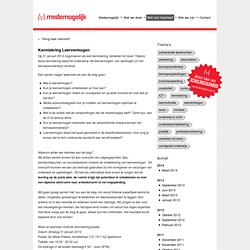
BLP_Aus_2008_1. Building Learning Power - Lerenprimair. Hokjesgeest Leren is vooral vol van context en nuance.

En dus daarom: Maak nooit lijstjes over wat je moet doen of geloven. Behalve deze dan… Geloof nooit het woord ‘nooit’ als het over leren gaatWantrouw altijd het woord ‘altijd’ als het over leren gaatPlak op kinderen geen stickers over ‘hoe ze leren’; we hebben allemaal onze voorkeuren maar alles valt te leren, ook hoe je leert.Zet wat je wilt laten leren boven de taak die jij hebt bedacht of wat het boek je opdraagt; effectief leren wordt door de leerling bepaalt. Gun ze dat door ze het doel te geven.Daar komt wel bij kijken dat je kinderen moet helpen hun leren effectiever te kunnen maken; geef ze dus naast het inzicht ook het gereedschap.Maar ook vooral: luister naar ouders.
Ruth Deakin Crick: Introducing ELLI. Learning Emergence. The Hampshire Teaching Schools Alliance has formed a Networked Improvement Community with structured social arrangements which joins academic research, clinical practice and commercial expertise in sustained programmes of Design Educational Engineering and Development (Bryk et al 2010).
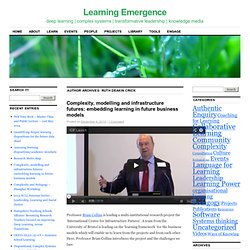
This is an approach to improvement which is being developed in education by the Carnegie Foundation for the Advancement of Teacher Education It offers a productive synthesis across the research-practice divide. It aims to meld the conceptual strength and methodological norms associated with traditional research with the contextual specificity, deep clinical insight and practical orientation characteristic of action research.
Participants in a Networked Improvement Community endorse shared, precise, measureable targets which achieve a shared purpose. They address shared,complex problems and participate in whole systems designing processes aimed at clarifying the problem/challenge/solution space. Learning Power. TheLearningPoweredSchool_Extract_TLOLimited_2011. Guy Claxton – The virtues of a good education. We live in a morally bashful age.
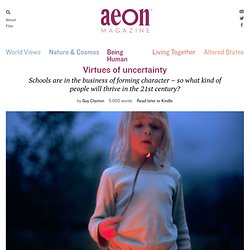
Perish the thought that anyone might try to impose their values on anyone else. Trying to ‘adopt the moral high ground’ sounds, to modern ears, arrogant or hubristic. You risk becoming a figure of fun, like a Speakers’ Corner tub-thumper. Education colludes with this squeamishness by pretending that the only serious questions it faces are technical ones, such as how are we going to raise standards?
Or what are the most appropriate methods for testing students, and when, and how much? But this coyness is both weaselly and pusillanimous. Despite occasional bursts of rhetoric about developing that mysterious beast ‘the world class workforce’, the goal of most education ministers turns out to be beating Singapore or Finland in the tables of PISA, the Program for International Student Assessment: in other words, to keep racking up the test scores, without stopping to think what those scores are meant to indicate.
Politicians are not alone. 1. 2. 3. 4. 5.